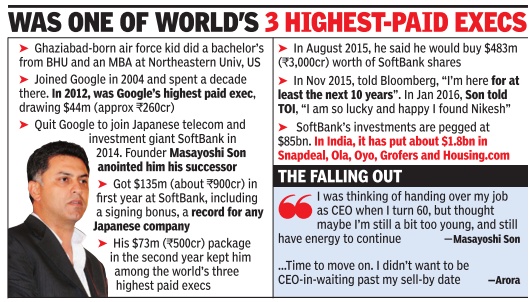Nikesh Arora



This is a collection of articles archived for the excellence of their content. |
2012- 2023/ 24
Bloomberg, January 4, 2024: The Times of India

From: Bloomberg, January 4, 2024: The Times of India
Arora rare non-founder tech billionaire
Nikesh Arora has repeatedly succeeded in winning big paychecks. At Google, he became the firm’s highest-paid executive after getting a compensation package worth about $51 million in 2012, on his way to collecting stock awards worth at least $200 million by the time he left.
Poached in 2014 by SoftBank’s Masayoshi Son — and touted as the legendary investor’s likely successor — he amassed a $135-million first-year compensation package that broke Japanese records and made him the world’s best-paid executive.
But it’s Arora’s latest stint, as CEO of cybersecurity firm Palo Alto Networks, that’s catapulted the 55-year old into the billionaire class.
Palo Alto Networks handed Arora a $125-million stock and options compensation package when he was hired in 2018. Thanks to a boom in cybersecurity software af ter a series of high-profile hacking incidents that disrupted casinos and markets, the company’s share price has more than quadrupled since then — and Arora’s stake is now worth $830 million.
Combined with enormous pay awards he secured earlier in his career, Arora’s net worth stands at $1.5 billion. That makes him a rare non-founder billionaire tech CEO. A spokesperson for Palo Alto Networks didn’t respond to requests for comment.
The bulk of Arora’s stake in Palo Alto Networks relates to more than 3.4 million options he was awarded upon joining the firm. Those were subject to meeting share-price targets, all of which have now been achieved including the highest goal: a 300% gain. Arora sold nearly $300-million worth of stock in 2023 after exercising some of the options.
BLOOMBERG
2016: Quits SoftBank
The Times of India,Jun 22 2016
Nikesh Arora, the heir apparent at SoftBank, will step down from the Ja panese company in a surprise departure after founder Masayoshi Son made clear he wouldn't get the top executive role in the near future. The former Google executive had come under fire from some investors over his qualifications for the job. But Son said those criticisms played no part in the departure. Rather, the founder said that he wants to remain at the helm of the company for a few more years, while Arora aspired to be chief executive officer more quickly . Arora will remain as an adviser to SoftBank.
Son, who had called Arora his likely successor earlier this year, decided he wants to maintain control of the company he built from a computer software distributor into one of Japan's largest telecommunications and investment holding corporations. Still, the abrupt departure left analysts questioning the motivation behind the events.
“You can't really sprinkle any sugar on this one. This shows disunity ,“ said Amir Anvarzadeh, manager of Japanese equity sales at BGC Partners Inc. “Given how much Son was putting the responsibility of running the business into his hands, to have him not there, I don't think anyone would say the share price will start going up.“
Son praised Arora, one of the highest-paid company officials in the world, and credited him with playing a pivotal role in Tuesday's deal to sell a majority stake in Supercell Oy that valued the Clash of Clans developer at $10.2 billion. But Son said he isn't ready to let go.
“I feel really terrible for ha ving inconvenienced Nikesh, but it would not be good to go out while holding my feelings back,“ Son said at the briefing in Tokyo, as a smiling Arora looked on. Arora's exit may deal a blow to SoftBank's global aspirations. He was hired in 2014 after a decade at Google and promoted to president in June of last year. He's since built his own operation within SoftBank, an investment arm that will take stakes in technology companies around the world.
Though SoftBank put money into startups for decades, including a tumultuous foray during the dot-com bust, the effort had dwindled in recent years to what Son called a “hobby“ next to his wireless and broadband businesses. Arora revived the venture push and infused it with more ambition.
Arora led a search for the next Alibaba, the Chinese ecommerce leader that pulled off the world's largest IPO in 2014. SoftBank is the biggest shareholder in Alibaba. Arora spearheaded investments in Indian e-commerce provider Snapdeal, ride-hailing service Ola, real-estate website Housing.com and hotel-booking app Oyo Rooms. In October, SoftBank led a $1 billion fund raising round for US-based online lender Social Finance.
“I'm very proud of what we achieved in the last two years,“ Arora said. “Masa has learned that SoftBank has new muscles that it can exercise.“
Still, SoftBank's shares have languished, beaten back in part by its ill-advised investment in loss-making Sprint and its heavy debt load. Arora helped lead a recent round of asset sales, including the Supercell deal, aimed at strengthening the balance sheet.
A separate letter to the board of Sprint, which SoftBank controls, asked for his removal as a director there for similar reasons. A special committee of independent directors convened to look into the accusations found the claims without merit, SoftBank announced Monday .
After the announcement, Arora took to Twitter with a flurry of more than 30 posts.He responded to well wishers and answered questions. One person asked what he would do next. “The plan is no plan,“ Arora wrote